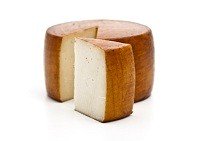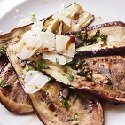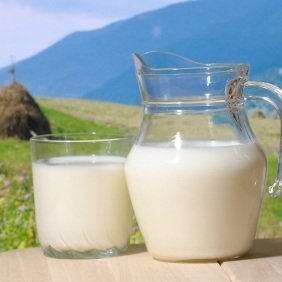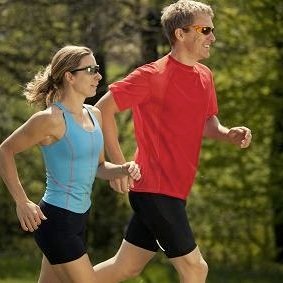Lose Weight
![]() Calories in Food
Calories in Food
![]() Calories in Dairy
Calories in Dairy
![]() Calories in Romano Cheese
Calories in Romano Cheese
Calories in Romano Cheese, Romano Cheese Nutrition Facts
How many calories in Romano cheese? See below, the Romano cheese calories for the different serving sizes. We provide you with Romano cheese nutrition facts and the health benefits of Romano cheese to help you lose weight and eat a healthy diet.
Romano cheese is a very hard cheese, yellow in color, originating from Italy. There are numerous varieties which can be made from either cow’s, sheep’s or goat’s milk. Arguably the most well know is Pecorino Romano made from sheep's milk, whilst Vacchino and Caprino are made from cow's and goat's milk respectively.
Romano cheese is high in fat, approx. 27g per 100g, but also very high in sodium (hence its very salty taste).
If you are on a weight loss diet, you should probably completely avoid, or just have a few small shavings. It does though provide a very good source of protein and calcium as the milk content is very high. It also has a good source of vitamins A, B1-B3, B5, B6, B12, D, E, K, phosphorus and selenium.
It is very good for building healthy bones and teeth. Other Romano cheese benefits are thought to include added protection against cardiovascular disease given the high conjugated linoleic acid (CLA) content. Studies of conjugated linoleic acid (CLA) have shown that it helps with weight loss.

Whilst we don’t generally recommend supplements as we believe all nutrients and vitamins should come from eating healthily, this is one supplement you may want to consider if you are giving up cheese as part of your weight loss program.
Compare calories in Romano cheese with the other calories in cheese and dairy products.
Calories in Romano Cheese
Refuse: 0%| Serving Size | Calories per Serving |
| 100 grams | 387 kcal (1618 kJ) |
| 1 oz, 28.35 grams | 110 kcal (459 kJ) |
| 1 package (5 oz), 142 grams | 550 kcal (2298 kJ) |
Romano Cheese Nutritional Information
| Nutritional value per 100 g (3.5 oz) | |
|---|---|
| Proximates: | |
| Water | 30.91 g |
| Energy | 1618 kJ (387 kcal) |
| Protein | 31.80 g |
| Carbohydrates | 3.63 g |
| Sugars | 0.73 g |
| Total Fat: | 26.94 g |
| saturated fat | 17.115 g |
| monounsaturated fat | 7.838 g |
| polyunsaturated fat | 0.593 g |
| Cholesterol | 104 mg |
| Minerals: | |
| Calcium, Ca | 1064 mg (106 %) |
| Iron, Fe | 0.77 mg (4 %) |
| Magnesium, Mg | 41 mg (10 %) |
| Phosphorus, P | 760 mg (76 %) |
| Potassium, K | 86 mg (2 %) |
| Zinc, Zn | 2.58 mg (17 %) |
| Copper, Cu | 0.030 mg (2 %) |
| Manganese, Mn | 0.020 mg (1 %) |
| Selenium, Se | 14.5 mcg (21 %) |
| Vitamins: | |
| Thiamine (Vit. B1) | 0.037 mg (2.5 %) |
| Riboflavin (Vit. B2) | 0.370 mg (22 %) |
| Niacin (Vit. B3) | 0.077 mg (0.4 %) |
| Pantothenic acid (B5) | 0.424 mg (4 %) |
| Vitamin B6 | 0.085 mg (4 %) |
| Folate (Vit. B9) | 7 mcg (2 %) |
| Vitamin B12 | 1.12 mcg (19 %) |
| Vitamin A | 415 IU (8 %) |
| Vitamin E | 0.23 mg (1.2 %) |
| Vitamin D | 20 IU (5 %) |
| Vitamin K | 2.2 mcg (3 %) |
| Percentages are relative to US Recommended Daily Intake (RDI) for adults. | |
Author: Lana Soko
You Might Also Like:
Like This Page?
|
Share This Page:
|







